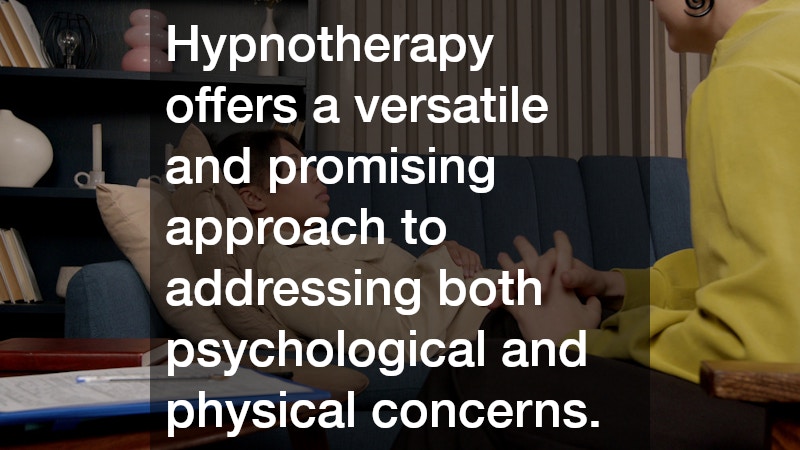Hypnotherapy is an intriguing form of complementary therapy that utilizes hypnosis to foster mental and physical well-being. Through guided relaxation, intense concentration, and focused attention, patients enter a heightened state of awareness sometimes called a trance. Hypnotherapy has gained recognition for its potential benefits in addressing a range of issues, from mental health challenges to facilitating behavioral changes.
How Does Hypnotherapy Work?
The Science Behind Hypnotherapy
At its core, hypnotherapy relies on the principles of hypnosis, which is a naturally occurring state of mind characterized by heightened focus and suggestibility. Scientific studies indicate that during hypnosis, brainwave patterns change, mirroring those of deep meditation.
This shift allows individuals to access memories or thoughts buried in the subconscious, providing an opportunity for therapeutic interventions.
In therapeutic settings, hypnosis can be used to bypass the critical mind and access the subconscious for healing purposes. Research has shown that hypnotherapy can alter neural pathways, making it easier to adopt new habits and perspectives. This adaptability of the brain under hypnosis is what makes hypnotherapy a powerful tool in various treatments.
What to Expect in a Session
A typical hypnotherapy session starts with an initial conversation where the therapist understands the client’s specific goals. Following this discussion, the therapist guides the client into a state of deep relaxation, often using verbal cues and imagery. When the client reaches a hypnotic state, the therapist introduces positive suggestions or explores underlying issues contributing to the client’s concerns.
Sessions are typically calm and client-centered, ensuring that comfort and trust are paramount. The degree of hypnosis achieved varies from person to person, but even light states can be effective for therapeutic outcomes. After the session, clients are gradually brought out of the hypnotic state, often feeling calm and relaxed.
What Conditions Can Be Treated with Hypnotherapy?
Mental Health Concerns
Hypnotherapy is gaining traction for its potential to support individuals with mental health issues such as anxiety and depression. By accessing the subconscious, it can help uncover and address root causes of emotional distress. Treatment can include altering negative thinking patterns and managing stressful triggers more effectively.
It offers a complementary approach alongside traditional mental health treatments, providing a holistic means of coping with psychological symptoms. Many clients report increased feelings of calmness and clarity after sessions, supporting their ongoing recovery. However, hypnotherapy should be conducted by qualified professionals to ensure it aligns safely with any existing mental health care plans.
Physical Ailments
Hypnotherapy is not limited to psychological conditions; it can also assist with managing physical ailments. It has been used to help individuals cope with chronic pain, reduce stress-related symptoms, and facilitate recovery from certain medical procedures. By promoting deep relaxation, hypnotherapy can help regulate the body’s response to pain and stress.
The mind-body connection in hypnotherapy allows patients to potentially reduce reliance on medication, as the therapy complements conventional pain management techniques. This alternative approach has shown promise in alleviating discomfort associated with conditions like fibromyalgia and migraines. Through hypnotic suggestion, individuals can learn self-management techniques that empower them in dealing with ongoing symptoms.
Behavioral Changes
Hypnotherapy is effective in facilitating behavioral change, as it targets and recodes subconscious patterns driving negative habits. It’s a popular choice for individuals looking to quit smoking, lose weight, or overcome compulsive behaviors. By reinforcing positive behavior strategies, patients can experience meaningful lifestyle changes.
Through repetitive and supportive suggestion, hypnotherapy helps replace undesired behaviors with healthier alternatives. This therapeutic approach empowers individuals to adopt practices aligned with their health and wellness goals. The commitment to behavioral change often leads to improved self-confidence and reinforced motivation.
For lasting behavioral change, hypnotherapy sessions typically involve goal-setting, visualization techniques, and accountability built into the therapeutic process. Clients are encouraged to tailor these strategies to fit their daily lives, sustaining momentum between sessions. Hypnotherapy’s personalized approach to behavior modification offers a structured path to achieving and maintaining desired changes.
Choosing a Qualified Hypnotherapist
Credentials and Qualifications
Selecting a qualified hypnotherapist is crucial to ensure safety and efficacy in treatment. Patients should look for practitioners with formal training and recognized certifications from accredited institutions. Membership in reputable hypnotherapy organizations can also signify adherence to ethical standards and ongoing professional development.
Additionally, verifying the practitioner’s specialty areas ensures they can adequately address specific concerns. Whether the need is mental health support, pain management, or behavioral change, specialized training can enhance therapeutic outcomes. Patients are encouraged to inquire about the therapist’s experience and success rates in treating similar cases.
Beyond credentials, personal comfort with the therapist is important for effective therapy. Building a trusting therapeutic relationship facilitates open communication and promotes a positive experience. Initial consultations can be useful in assessing whether the practitioner’s approach is a suitable fit for the client’s needs.
Red Flags and Considerations
When evaluating hypnotherapy services, it’s important to be aware of certain red flags indicating a potentially unethical or ineffective practitioner. Lack of proper certification or reluctance to provide credentials can be a warning sign. Unusual claims of guaranteed results or miracle cures should also be approached with caution.
Ethical hypnotherapists maintain clear boundaries and practice within the scope of their competence. Anyone promising “instant cures” or refusing to respect client autonomy should be scrutinized carefully. Clients should trust their instincts and feel comfortable in seeking alternative practitioners if something feels off.
Transparency about therapy goals, costs, and processes is essential for a trustworthy therapeutic relationship. Engaging with a hypnotherapist who prioritizes informed consent and client empowerment is key. Prioritizing these considerations ensures that individuals receive safe, ethical, and effective hypnotherapy services.
Hypnotherapy offers a versatile and promising approach to addressing both psychological and physical concerns. Through mindful application and a qualified practitioner, hypnotherapy provides a pathway to healing and personal development. Potential clients are encouraged to explore this option, keeping in mind the importance of choosing the right professional fit for their individual needs.


